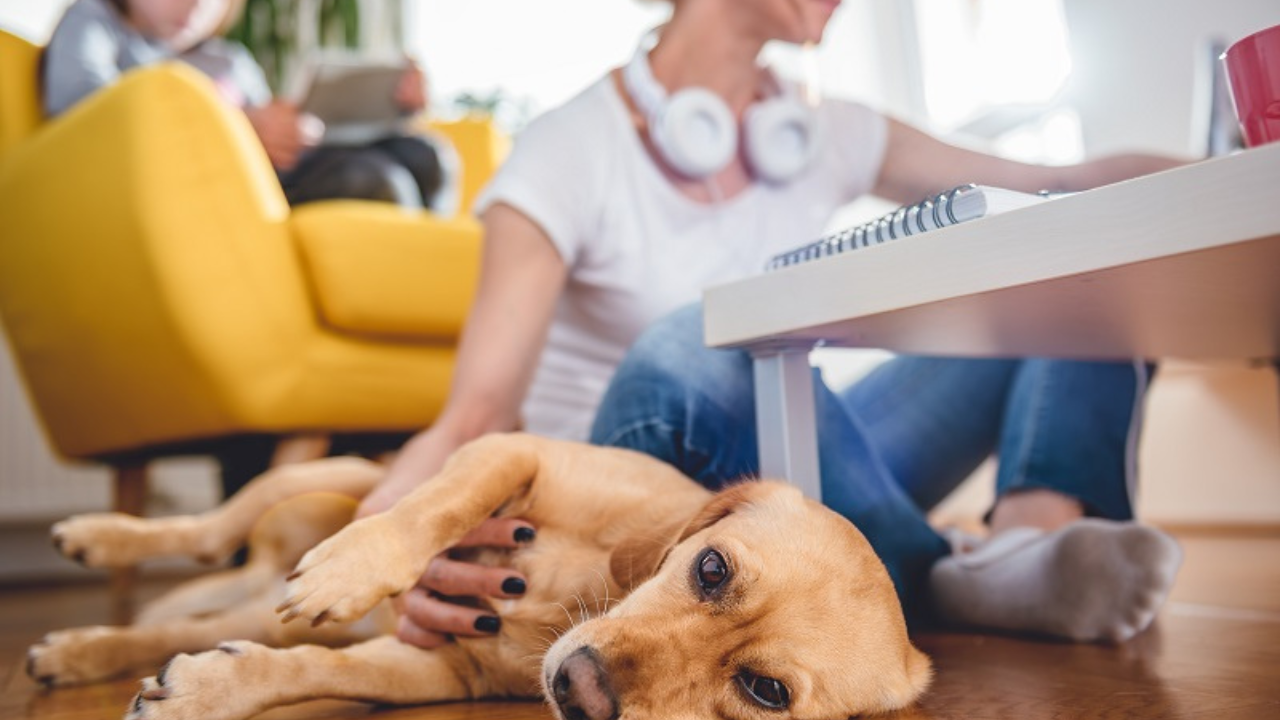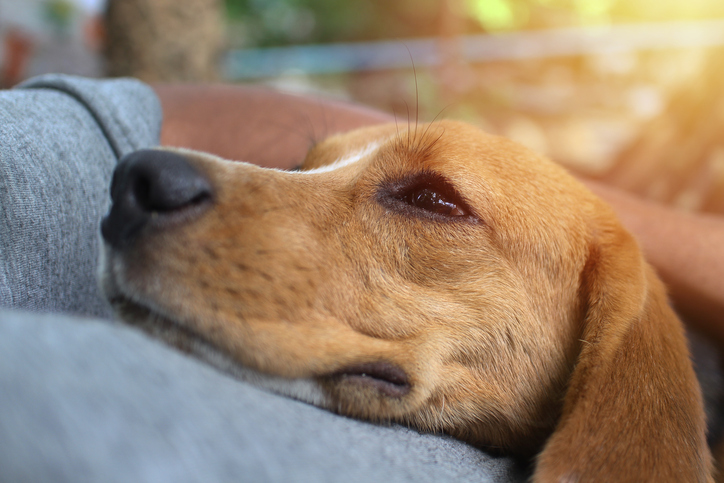Many dog owners experience the heart-wrenching feeling of their furry friend not seeming to like them. It's a common concern that can leave owners feeling rejected and confused. However, it's important to remember that dogs have unique personalities and preferences, just like humans do.

One reason a dog may not seem to like their owner is that they simply haven't bonded yet. Dogs are social animals and require time and effort to form strong relationships with their owners. If a dog has recently been adopted or moved to a new home, it may take some time for them to adjust and feel comfortable around their new human family.
Another factor that can affect a dog's relationship with their owner is their past experiences. If a dog has experienced abuse or neglect from humans in the past, they may be hesitant to trust and form a bond with their new owner. It's important to be patient and understanding, and to work with a professional trainer or behaviorist if necessary to help the dog overcome their past trauma.
Understanding Canine Behavior
Dogs are social animals and have a unique way of communicating with their owners and other dogs. Understanding their body language, vocalizations, and signs of affection can help pet owners build a stronger bond with their furry friends.
Body Language
Dogs communicate through their body language, and it is important to pay attention to their signals to understand their behavior. For example, a dog that is feeling aggressive may growl, show teeth, or snap. On the other hand, a dog that is feeling nervous or uncomfortable may cower, yawn, or flatten their ears.
Vocalizations
Dogs also communicate through their vocalizations. They may bark, whine, or howl to express their emotions or needs. It is important to pay attention to the tone and pitch of their vocalizations to understand their message.
Signs of Affection
Dogs show affection in different ways, and it is important to recognize their love language. Some dogs may enjoy petting and touching, while others may prefer to cuddle or play. Dogs may also wag their tails, lick their owners, or tuck their tail to show their affection.
In conclusion, understanding canine behavior is crucial for building a strong bond with your dog. Paying attention to their signals and indicators can help pet owners avoid aggressive behavior and mixed signals. By learning their love language and responding to their needs, pet owners can strengthen their relationship with their furry friends.

Factors Affecting Dog-Human Relationships
Dogs are known for their loyalty and affection towards their owners. However, there are times when a dog may not seem to like their human companion, which can be a cause of concern for the owner. Several factors can affect the relationship between a dog and their human, including breed characteristics, upbringing and socialization, and past trauma and experiences.
Breed Characteristics
Different dog breeds have distinct personalities and traits that can affect their relationship with humans. Some breeds, such as the Golden Retriever and Labrador Retriever, are known for their friendly and affectionate nature, while others, such as the Chow Chow and Shar Pei, can be more reserved and independent.
Moreover, certain breeds may have a higher tendency to develop trust issues with humans, which can affect their relationship negatively. For instance, guard dog breeds, such as the German Shepherd and Rottweiler, are trained to be suspicious of strangers, which can sometimes extend to their owners.
Upbringing and Socialization
A dog's upbringing and socialization play a significant role in their relationship with humans. Dogs that are not socialized properly during their early years may find it challenging to trust humans, which can lead to a strained relationship.
Additionally, dogs that have been punished harshly or subjected to traumatic experiences during their upbringing may develop a lack of trust towards humans, which can further exacerbate the situation.
Past Trauma and Experiences
Dogs that have been subjected to traumatic experiences, such as abuse or neglect, may find it challenging to trust humans. Trauma can lead to a lack of trust and fear towards humans, which can manifest in various ways, such as aggression or avoidance.
Moreover, dogs that have had negative experiences with humans, such as being hit or yelled at, may develop a negative association with their owners, which can affect their relationship negatively.
In conclusion, several factors can affect the relationship between a dog and their human companion. It is essential to understand these factors and take appropriate measures to improve the relationship, such as providing proper socialization and avoiding harsh punishments.
Improving Your Bond with Your Dog
If your dog doesn't seem to like you, it can be disheartening. However, there are steps you can take to improve your bond with your furry friend. Here are some effective ways to strengthen your relationship with your dog.

Effective Training Techniques
Training your dog can be a great way to build a stronger connection with them. By teaching your dog new commands and tricks, you can improve their behavior and communication skills, which will help you understand each other better. Some effective training techniques include positive reinforcement, clicker training, and reward-based training.
Consistent Positive Reinforcement
Consistency is key when it comes to building a bond with your dog. Positive reinforcement is an effective way to encourage good behavior and strengthen your connection with your dog. This can include verbal praise, treats, and toys. By consistently rewarding your dog for good behavior, they will learn to trust and respect you.
Respect and Understanding
Respect and understanding are crucial when it comes to building a strong bond with your dog. It's important to understand your dog's needs and personality, and to treat them with respect and kindness. This means being patient, calm, and encouraging, and avoiding punishment or negative reinforcement.
By following these tips, you can strengthen your bond with your dog and improve your relationship. Remember to be patient, consistent, and respectful, and to always communicate with your dog in a clear and positive way. With time and effort, you can build a strong and loving connection with your furry friend.
Recognizing and Addressing Fear and Anxiety
Dogs can exhibit a range of behaviors that indicate fear or anxiety. Recognizing these signs is the first step in addressing the problem.
Common Signs of Anxiety
Dogs that are anxious or fearful may hide, cower, or become aggressive. They may also exhibit nervous behavior such as pacing, panting, or trembling. These behaviors can be triggered by a variety of factors, including loud noises, new people or animals, or separation anxiety.
Approaches to Alleviate Fear
There are several approaches that can be taken to alleviate fear and anxiety in dogs. One approach is to desensitize the dog to the trigger that is causing the fear. This involves gradually exposing the dog to the trigger in a controlled environment until the dog becomes more comfortable with it.
Another approach is to use positive reinforcement to reward the dog for calm behavior. This can include treats, toys, or praise. It is important to avoid punishing the dog for fearful behavior, as this can make the problem worse.
In some cases, medication may be necessary to help alleviate the dog's anxiety. This should only be done under the guidance of a veterinarian.
Overall, it is important to address fear and anxiety in dogs to ensure their well-being and to prevent any potential aggressive behavior. By recognizing the signs of anxiety and using appropriate approaches, owners can help their dogs feel more comfortable and secure.
Daily Activities to Enhance Connection
If you are struggling to bond with your dog, incorporating daily activities to enhance connection can help strengthen your relationship. Here are some suggestions for interactive games, regular feeding and care, and quality time and attention to help build a stronger bond with your furry friend.
Interactive Games and Play
Playing interactive games with your dog can be a great way to enhance your bond. Activities such as fetch, tug-of-war, and hide-and-seek can help build trust, improve communication, and provide mental stimulation. Toys such as chewy toys and puzzle toys can also keep your dog entertained and engaged.
Regular Feeding and Care
Regular feeding and care is essential for your dog's health and well-being, but it can also be an opportunity to strengthen your bond. Feeding your dog at the same time every day can create a routine and help build trust. Additionally, grooming and massage can help your dog feel more relaxed and comfortable around you.
Quality Time and Attention
Spending quality time with your dog is crucial for building a strong connection. Whether it's going for walks, playing fetch, or simply cuddling on the couch, giving your dog your undivided attention can help them feel loved and secure. Eye contact, petting, and affectionate touch can also help build trust and deepen your bond.
Incorporating these daily activities into your routine can help enhance your bond with your dog. Remember to be patient and consistent, and most importantly, have fun!
Professional Assistance and Advice
If your dog does not seem to like you, it can be a frustrating and emotional experience. However, it is important to remember that there are professionals who can help you and your furry friend. Here are some options to consider:
When to Consult a Veterinarian
Before seeking help from trainers or behaviorists, it is important to rule out any medical issues. A veterinarian can conduct a thorough physical examination and run tests to determine if there are any underlying health problems that may be affecting your dog's behavior. For example, pain or discomfort can cause a dog to be irritable or avoid physical contact.
In addition to physical exams, veterinarians can also provide advice on nutrition and exercise, which can have a significant impact on a dog's behavior and mood. If your dog is not getting enough exercise or is not eating a balanced diet, it can affect their overall well-being and may contribute to their dislike of you.
Seeking Help from Trainers and Behaviorists
If your dog's behavior is not related to a medical issue, it may be time to seek help from a professional dog trainer or behaviorist. These professionals can help identify the root cause of your dog's behavior and provide guidance on how to address it.
:strip_icc()/jump--992416282-5c4a07efc9e77c000110c9a3.jpg)
Dog trainers can help with basic obedience training, such as teaching your dog to sit, stay, and come when called. They can also help with more complex issues, such as aggression or anxiety.
Behaviorists specialize in addressing behavioral issues, such as fear, anxiety, and aggression. They can work with you and your dog to develop a behavior modification plan that addresses the underlying cause of the behavior.
It is important to choose a trainer or behaviorist who uses positive reinforcement techniques and has experience working with dogs who have similar issues to your own. Be sure to ask for references and check their credentials before hiring anyone.
In conclusion, seeking professional assistance and advice can be a valuable step in addressing your dog's dislike of you. By ruling out medical issues and working with experienced professionals, you can help improve your relationship with your furry friend.
Establishing Boundaries and Personal Space
Dogs, like humans, have their own personal space and boundaries. Failure to respect these can result in a dog feeling uncomfortable or even becoming aggressive. In this section, we will discuss the importance of understanding a dog's personal space and how to teach and maintain boundaries.
Understanding Dog's Personal Space
A dog's personal space is the area around them that they consider to be their own. This space can vary depending on the dog's personality, breed, and past experiences. Some dogs may have a larger personal space than others, and some may be more sensitive to physical contact.

It is important to understand a dog's personal space to avoid making them feel uncomfortable or threatened. Approaching a dog too quickly or invading their personal space can cause them to become defensive or aggressive. It is important to approach a dog slowly and allow them to come to you on their own terms.
Teaching and Maintaining Boundaries
Teaching a dog boundaries is an important part of establishing a healthy relationship. This involves setting rules and limits for the dog and enforcing them consistently. Boundaries can include rules about physical contact, such as not allowing the dog to jump up on people or not hugging them tightly.
Consistency is key when it comes to maintaining boundaries. If a dog is allowed to break the rules sometimes but not others, they can become confused and unsure of what is expected of them. It is important to enforce the rules consistently to avoid any confusion.
In addition to setting boundaries, it is important to respect a dog's boundaries as well. If a dog seems uncomfortable around certain people or in certain situations, it is important to respect their feelings and give them space. This can help to build trust and a healthy relationship between the dog and their owner.
In conclusion, establishing boundaries and respecting a dog's personal space is crucial for building a healthy relationship with your furry friend. By understanding their needs and setting consistent rules, you can create a safe and comfortable environment for both you and your pet.
Frequently Asked Questions
- What are the signs that my dog may not be fond of me?
- There are several signs that your dog may not be fond of you. For example, your dog may avoid making eye contact with you, ignore your commands, or show signs of fear or aggression when you approach. Additionally, your dog may not be interested in spending time with you or playing with you.
- How can I improve the relationship with my dog if it seems distant or disinterested?
- To improve your relationship with your dog, try spending more time with your dog and engaging in activities that your dog enjoys. Give your dog plenty of positive reinforcement when it behaves well, and avoid punishing your dog for misbehavior. Additionally, make sure that you are meeting your dog's basic needs for food, water, exercise, and socialization.
- Why does my dog show affection to others but not to me?
- There could be several reasons why your dog shows affection to others but not to you. For example, your dog may not feel comfortable around you because of past experiences or because you are not meeting its basic needs. Additionally, your dog may be more comfortable with other people because they are less demanding or have a more relaxed demeanor.
- What could be causing my dog to avoid cuddling or close contact with me?
- There could be several reasons why your dog is avoiding cuddling or close contact with you. For example, your dog may be uncomfortable with physical contact because of past experiences or because it is not used to being touched in certain ways. Additionally, your dog may be experiencing pain or discomfort that is making it difficult to cuddle or get close to you.
- How do I interpret my dog's behavior if it doesn't seek my attention?
- If your dog is not seeking your attention, it could be a sign that your dog is not comfortable around you or that it is not getting enough exercise or socialization. Additionally, your dog may be experiencing anxiety or other emotional issues that are causing it to withdraw from you. To interpret your dog's behavior, pay attention to its body language and try to identify any patterns or triggers that may be causing your dog to avoid you.
- What steps can I take if my dog is not as affectionate towards me as I'd like?
- To increase your dog's affection towards you, try spending more time with your dog and engaging in activities that your dog enjoys. Give your dog plenty of positive reinforcement when it behaves well, and avoid punishing your dog for misbehavior. Additionally, make sure that you are meeting your dog's basic needs for food, water, exercise, and socialization. If your dog's behavior does not improve, consider seeking the advice of a professional dog trainer or behaviorist.




